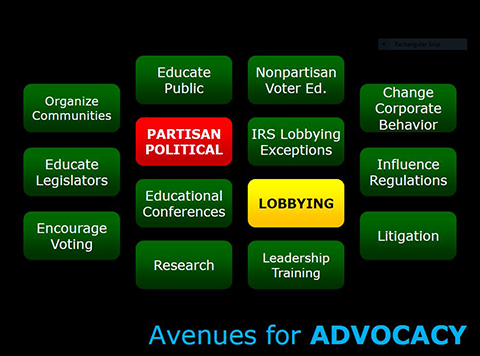Just in time for election season, our colleagues from the Southern California Counsel of Alliance for Justice held a workshop at our offices this week to give our staff and project leaders an in-depth look at what a 501(c)3 nonprofit organization can and cannot do in terms of advocacy. Because nonprofit organizations receive tax exemptions and tax-deductible contributions, their part in acceptable lobbying activities is extremely limited. They absolutely cannot support or oppose a political candidate for office and must remain “nonpartisan.”
The chart below identifies acceptable nonprofit advocacy activities in green, limited activity in yellow and restricted activity in red.

Additional take-aways from the event, presented by Shyaam Subrmaniam, included:
- Nonprofit organizations can educate the public and legislators on issues relating to their organization as long as they do not encourage or identify specific legislation. This is considered advocacy.
- Nonprofit organizations may lobby only if they abide by the regulations set forth by the IRS and have unrestricted funds that permit them to do so. Unrestricted funds are monies given with permission to be used for lobbying and will not be applicable for tax-deductions by the donor.
- Nonprofit organizations cannot engage in any partisan political activities, such as supporting or endorsing candidates or candidate-identifying measures or issues.
What is lobbying?
Lobbying is considered an attempt to try to influence legislation. Contacting legislators and encouraging the public to contact their legislators, asking them to oppose or support specific legislation and expressing your organizations view on a piece of legislation in online/print communications or publically, are all forms of lobbying. Legislators are considered any government employee at the local, state federal and international level. Projects under fiscal sponsorship with Community Partners, should you engage in permissible lobbying, simply report your activities in our Lobbying Activity Survey located in the project portal and send it to contracts@communitypartners.org. This will allow us to properly report our projects’ activities to the IRS.
What is considered specific legislation?
Legislation includes ballot measures, nominations, non-binding resolutions, budget appropriations, and judicial and executive branch measures. Even if a piece of legislation is not yet written, introduced or in full fruition, your expression for action on any piece of legislation is considered lobbying.
What is not considered as specific legislation?
If you are trying to influence regulations, executive orders, litigation or the enforcement of existing laws, that is not considered as specific legislation by the IRS and is permissible.
What is not considered lobbying?
Ask yourself if you are trying to influence legislation as a guide to help you determine if you are engaging in lobbying. Educating on a specific issue without offering a specific solution to a diverse audience, publishing a well-rounded, nonpartisan study or research analysis on an issue, is not lobbying.
How can my project remain nonpartisan during an election season?
By law, 501(c)3 organizations cannot support or oppose a political candidate running for public office. Do not publicly express approval or opposition to a candidate’s position or proposed action on specific issues, do not time your advocacy to try to influence legislation or a candidate election, and do not target a specific community with your message in order to influence an election or form of legislation.
Alliance for Justice is a national association of 100 organizations operating within the United States that is the leading expert on the legal framework for nonprofit advocacy efforts, providing definitive information, resources, and technical assistance that encourages organizations and their funding partners to fully exercise their right to be active participants in the democratic process.
Alliance for Justice staff is available to our projects for free coaching and advice on how to navigate laws affecting nonprofit advocacy. Please contact advocacy@afj.org or call (866) 675-6229.
For a plethora of free advocacy and lobbying information please visit Alliance for Justice’s initiative, Bolder Advocacy.
Avenues for Advocacy diagram courtesy of Alliance for Justice
Join our mailing list!
Keep up on the latest from Community Partners—our partnerships, learnings, grant opportunities, resources and more.



